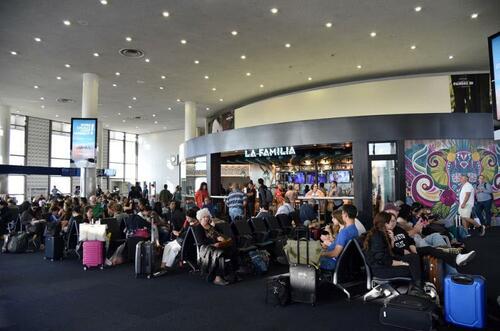By Peter Romeo of Restaurant Business,
The City Council of Los Angeles is scheduled to consider a proposal on Dec. 11 to raise the minimum wage for workers employed in the restaurants at Los Angeles International Airport (LAX) to $30 an hour.

The initiative slated for consideration calls for increasing the minimum wage to $25 an hour no later than six months after traffic in the airport resumes the levels of 2019, or before air travel dropped precipitously because of the pandemic. That threshold is expected to be reached possibly this year, meaning the increase would come in 2025.
The minimum would then rise by $1 every July until the pay floor reaches $30 an hour.
The minimum permissible wage for the workers is currently $19.25.
Hotel employees covered by a collective bargaining agreement hammered out with the city during the first quarter of 2024 would also be eligible for the raises. The trigger for those workers would be hitting the occupancy rate enjoyed by city hotels in the pre-pandemic days of 2019.
Workers in several dozen hotels would be affected.
The Airport Restaurant & Retail Association, a trade group for airport concessionaires, called the proposal “a bridge too far.” It noted that the proposed increases would amount to a 56% wage hike over a four-year period for the eligible employees.
According to the association, the wages of airport-restaurant employees have been soaring. The lift is coming in part because of the additional challenges someone working in an airport restaurant is forced to address. For instance, their trip to work can easily take 45 minutes because they have to traverse the airport and contend with security screenings. Someone working in a streetside facility may need only 10 minutes to get to the job, the group stressed.
In addition, nearly 70% of airport concession workers are covered by collective bargaining agreements.
The proposal to be considered by the City Council is the result of what labor authorities called segmental bargaining, or negotiating a labor contract across a group of employees doing similar work across a multitude of employers.
Segmental bargaining came to the restaurant industry in April with the creation of the Fast Food Council, a nine-person panel empowered by the state to set wages for fast-food employees who work for a restaurant with at least 59 sister branches nationwide. The council consists of four workers’ representatives and four employers, with a neutral government worker wielding a ninth and potentially tie-breaking vote.
Simultaneous with the creation of the council, the minimum wage for covered fast-food workers rose to $20 an hour on April 1, from a previous floor of $16.
Loading…